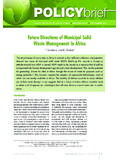Transcription of Information and Communication Technology (ICT) as a …
1 Information and Communication Technology (ICT) as a Means of Enhancing Education in Schools in south Africa:Challenges, Benefits and RecommendationsThabani MdlongwaThis policy brief proposes that the education authorities of the national departments of Basic Education (DBE) and Higher Education and Training (DHET) in south Africa adopt measures that will see the use of Information and Communications Technology (ICT) as a means of enhancing education in south Africa. The south african education system has for a number of years faced immense challenges, which range from mud schools to low pass rates at matric level, high dropout rates, high levels of absenteeism by teachers in schools and, mainly, the poor efficiency and productivity of both teaching and learning in schools. One way in which we could overcome the challenge of low efficiency and productivity of both teaching and learning would be through the use or introduction of ICT in south african schools.
2 Based on previous research carried out in this field within south Africa and Africa at large, this policy brief looks at some of the challenges, benefits and recommendations relating to the use of ICT as a means of enhancing education in schools in south Africa. 1 Africa Institute of south Africa AISA POLICY brief Number 80 August 2012111 Thabani Mdlongwa is a Research Intern: Sustainable Development Programme, at the Africa Institute of south Africa(AISA), Pretoria. AFRICA INSTITUTE OF south AFRICA BRIEFINg NO 80 AUgUST 2012are exchanged, or Information and knowledge is shared, through using Communication like cell phones, and Technology like computers, to connect Castells likens the power of ICT to the impact that access to electricity and clean running water in a community has had on human In the field of educational development, which can be described as any novel action which seeks to enhance the efficiency and IntroductionThe advent of the twenty-first century has seen a number of technological developments which affect almost every aspect of our lives.
3 At the core of this is the ever-growing use of ICT in all realms of life, from the workplace to the sports field, in schools and on a personal or social level. ICT is defined as a global network in which ideas 2 AISA POLICY brief Number 80 August 2012 Africa Institute of south Africa The Electronic and Communications Trans-action Act, No. 25 of 2002, was established by the Department of Communications (DoC) in a bid to lead all ICT initiatives in south Africa and to develop a five-year national e-strategy which would empower all citizens, especially the education sector. A number of various initiatives, both legislative and to do with policy, have been undertaken by various government departments to support the integration of ICT into teaching and south african government, through the DoC, hosted a National ICT Policy Colloquium on 19 20 April 2012, at Gallagher Estate.
4 The aim of the colloquium was to start a process of reviewing all the government ICT policies that have been in existence since 1994. The DoC also hosted an ICT Indaba in Cape Town in June 2012, which brought together various stakeholders in business, labour, academia and civil society across Africa and the world. It was hoped that from the numerous measures outlined above and others, south Africa would be able to develop and enhance its ICT capability in the near current ICT profile in south african schools The use of computers was introduced into schools in south Africa during the 1980s, primarily in private schools and a few well-resourced government Initially computers were used mainly for administrative purposes, such as keeping student records, recording examination marks, producing school reports and creating timetables, but with the continuous advances in ICT, this later There are 2 311 schools in south Africa with one or more computers, and it is estimated that 10 per cent of south Africa s 28 000 schools have access to one or more The implementation of ICT in south african schools is being led by SchoolNet.
5 Which also provides staff development and ICT support to One of the biggest challenges to implementation of ICT across all south african schools is that the Government of south Africa does not have enough funds to purchase computers and build infrastructure with regard to ICT in the various provincial educational government also does not prioritise the issue of ICT implementation as compared productivity of both the teaching and learning of any particular subject, ICT has thus become a core part of this south african schools have used traditional teaching methods that have stayed the same for the last few decades or so. Educational institutions in south Africa, in particular previously dis-advantaged schools, face numerous challenges, such as the dwindling ability to collect school fees from parents of learners, and declining financial support from the government.
6 The failure or challenge faced by schools in south Africa that do not use ICT as a means of enhancing teaching and learning has led to south Africa s failing to close the digital divide . The digital divide is defined as the gap between those individuals who benefit from digital Technology and those who do The use of ICT in schools to enhance learning could help overcome some of the challenges of improving the efficiency and productivity of both learning and teaching in south african schools, thereby narrowing the digital divide, south Africa s general ICT profileIn south Africa, which has an estimated current population of 48 million people, the number of internet users grew to three million in 2002; as of 2005, out of every 100 south Africans, 10,75 had internet access, while 10 per 100 had fixed According to the Department of Education (DoE) White Paper on e-Education, ICT usage in Africa increased to 20 per cent in 2002.
7 However, this was not evenly spread, as the usage was mostly in countries with a high gross domestic product (GDP) per capita, and mainly in urban The DoE points out that as of 2002, 6,4 per cent of south Africans had access to and used the internet, as compared with 72,7 per cent of Americans, indicating that south Africa is still lagging behind in ICT The government has responded to this lag, and in trying to bridge the digital divide, introduced a whole range of measures, which included the following:8 In 2001, the Presidential National Commission on Information Society and Development (PNC on ISAD) was established. The commission comprised members of both the public and private sector, and its main goal was to act as an advisory group to the government on challenges regarding ICT development in south Africa and how south Africa could address these challenges in order to be globally Africa Institute of south Africa AISA POLICY brief Number 80 August 2012with other basic necessities like communities having clean running water, sanitation and electricity, which always take precedence over ICT The result of this is that south african schools are lagging behind as regards ICT implementation and educational to the DoE White Paper on e-Education of 2003, the nine provinces within south Africa have recorded varying levels of progress as regards ICT Gauteng.
8 The Western Cape and Northern Cape had at that time made significant progress in this regard; however, the other six provinces continue to lag Despite the slow progress with ICT development according to the DoE, the government, in partnership with non-governmental organisations (NGOs), has responded to bridging the digital divide by initiating a number of projects, which include the following: INTEL Teach to the Future teacher development programme provides insights for teachers on ICT integration into teaching and learning. SCOPE, which is a Finnish development support programme, has, in collaboration with SchoolNet SA and the south african Institute for Distance Education (SAIDE), developed 11 teacher development modules for introduction into schools. SchoolNet SA provides online, mentor-based programmes that provide in-service training to teachers on how to integrate ICT into the curriculum and its of the big disadvantages of ICT statistics for south african schools is that they are not up to date, and researchers unfortunately have to rely on Information that is from five to six years old.
9 So the Information below is the best available. According to the DoE, despite the number of schools with computers for learning and teaching having increased from 12,3 per cent in 1999 to 26,5 per cent in 2002, there were still more than 19 000 schools without computers for teaching and learning purposes in The DoE also points out that it faces a number of challenges in compiling accurate statistics for the ICT profile within south african Due to various factors like the redundancy rate, the level of usage and the sharing of ICT resources, compiling statistics on the south african ICT profile becomes problematic. Despite this, the DoE, through its Education Management Information System and Information received from provinces, managed to compile an ICT profile of south african schools in Table 1 above reflects the distribution of ICT in schools across all provinces in Table 1 it is quite evident that there are huge disparities between most of the provinces as regards ICT implementation, and that the Eastern Cape is the poorest performing province in the whole of south Africa, lagging seriously behind the three best-performing provinces: Gauteng, the Northern Cape and the Western growing use of ICT in education: enhancing teaching and learning worldwide The integration of ICT into the curriculum of learners is of immense benefit to them.
10 Firstly, exposure to ICT allows learners to develop skills Table 1 Distribution of computers in south african schools by province ProvincesSchools with computersSchools using computers for teaching and learningEastern Cape Cape % : DoE, 2003, POLICY brief Number 80 August 2012 Africa Institute of south Africa4that will give them an edge in an ever-increasingly Technology -saturated work environment. Secondly, the introduction of ICT into the school curriculum allows learners to become creators of knowledge in their own right, for example through conducting research for a school project on the internet and then having to produce, say, a PowerPoint presentation. Furthermore, learners who continue to use ICT in doing their assignments and projects begin to cultivate a culture of personal Information management, independent learning and working without supervision, Communication skills, teamwork and research skills, which are highly valued in today s global only does ICT enhance the development of learners; it also enhances the development of teaching instruction by teachers.







